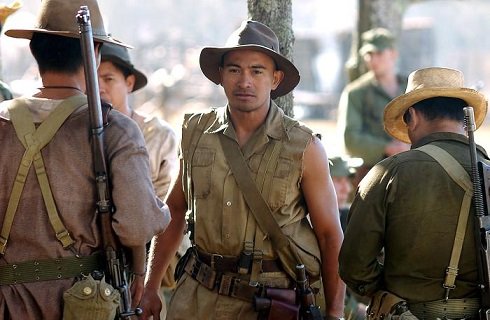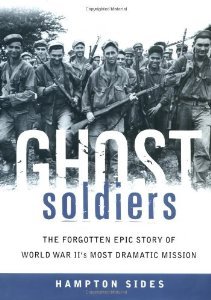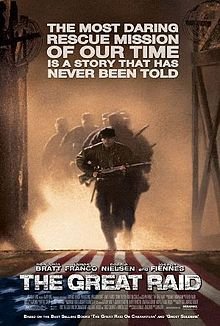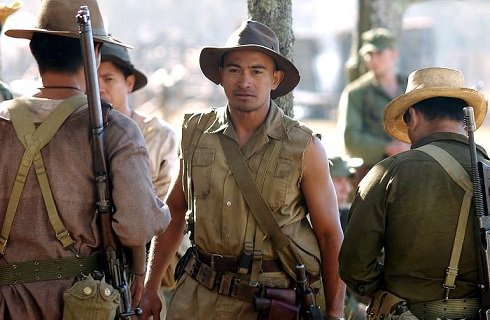
By PABLO A. TARIMAN
THIS year is the 68th anniversary of the heroic rescue of allied prisoners of war and civilians from a Japanese concentration camp near Cabanatuan City on January 30, 1945.
The dramatic rescue inspired the Hollywood film, “The Great Raid” starring Benjamin Bratt, Joseph Fiennes, James Franco and our own Cesar Montano as Captain Juan Pajota. The film is largely based on William Breuer’s book of the same title.
But there is no doubt that the most suspenseful account of the Cabanatuan Raid is told in another book, “Ghost Soldiers” by Hampton Sides who attended one anniversary rites in Cabanatuan along with Montano.
“The Great Raid” which employed several Filipino actors in Australia turned out to be a big flop (it only earned roughly $10,000,000 world-wide and it has a budget of more than $80,000,000).
But re-reading the Sides book (this should be included as summer reading fare), you realize the film didn’t live up to the book and even manage to underplay the crucial role of Filipino guerillas in that Cabanatuan raid.

Noted Wesley Morris of the Boston Globe which called the film a noble failure. “On screen, at least, the raid to free the prisoners isn’t all that great – just a bunch of explosions and combat maneuvers. Still, it’s the one sequence in the film where everybody works with the same conviction. The audience, meanwhile, has to sit around with the prisoners, waiting for this to happen. It’s a long wait.”
In the film, two Filipinos figure in the historic rescue: the late Nueva Ecija Gov. Eduardo Joson (then captain and leader of Squadron 213 of the guerilla fighters) and Captain Pajota (Montano), who helped carry out the mission.
Former Gov. Tomas Joson III said he learned about the historic rescue only through the Sides book.
Indeed it was a well-planned operation staged by American rangers trained for dangerous operations. What was overlooked in the film was that it was a big success largely because of the big role of the two Filipino guerilla leaders, Joson and Pajota.
In “Ghost soldiers,” then Captain Joson – who would become provincial governor after the Liberation – was in his mid-30s. He is described in the book as “a natural politician with a knack for gentle persuasion.”
Formerly attached to the 91st Filipino Infantry, Pajota ha been cut off from Filipino-American forces during the retreat to Bataan but had perfected his skills as a saboteur and hit-and-run artist. The Japanese could not keep up with him. Thus Pajota was just perfect partner for the Cabanatuan raid.
The matter of saving the remaining 500 prisoners of war in Cabanatuan became urgent and critical with the discovery of mass slaughter of American soldiers in another Japanese camp in Palawan a few weeks before the Nueva Ecija raid.

“The plight of prisoners in Cabanatuan had been on my mind for many months. We feared that once the Japanese thought the invasion was imminent, they would kill all the prisoners,” wrote Robert Lapham, the leader of American guerillas.
But how do you transport the prisoners most of whom were sick, if not altogether rendered invalid, by hunger and torture?
One of Pajota’s suggestions that worked was the use of carabao carts as get-away transport for the rescued prisoners. The leader of the raid found the suggestion absurd but he realized it was also the most feasible move.
Believe it or not, the raid was over in 30 minutes.
What makes the book a thoroughly absorbing read is the wealth of details on the background and ordeals of survivors of the Bataan Death March and how they survived three years in the concentration camps.
There are other tales of heroism in the book among them about priests and couriers involved in keeping the prisoners alive and keeping the communication lines open while waiting for the return of Gen. Douglas MacArthur.
There is also this equally absorbing story of an American Mata Hari named Claire Phillips who owned an exclusive night spot called Tsubaki Club used for spying on Japanese officers and soldiers. Phillips raised money and medicine for prisoners of the Cabanatuan concentration camp.
“Ghost Soldiers” is a well-written book and a great read.
No wonder “The Great Raid” the movie had a hard time living up and doing justice to this great book.
